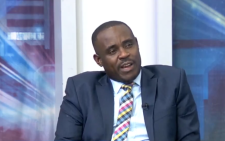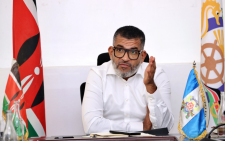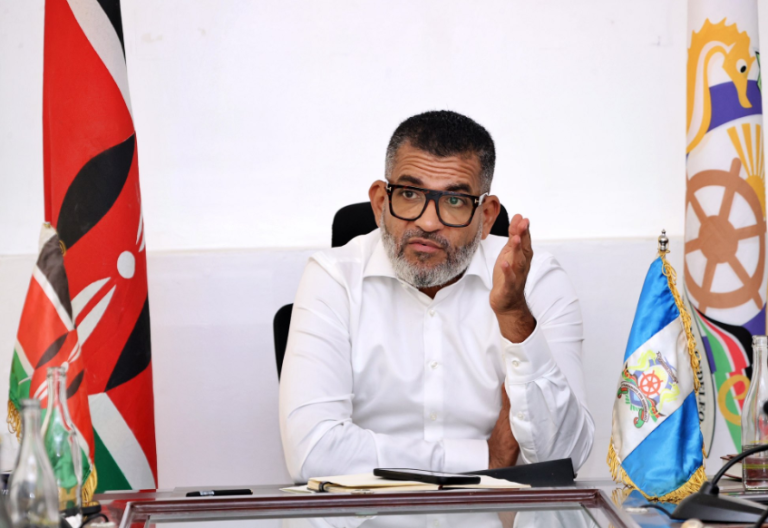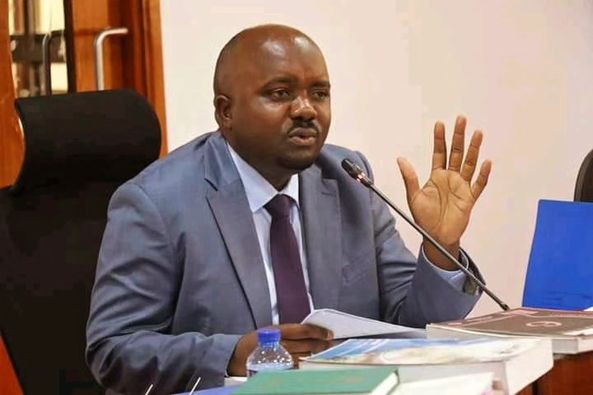Police shoot trader as protesters vent anger over brutality

A man was shot at point-blank range and a number of other people injured on Tuesday, June 17, 2025, as Kenya ebbed into the throes of widespread unrest, with the current wave of protests plunging the government into confusion and uncertainty.
The man, a mask seller in Nairobi, was shot by police officers along Moi Avenue.
Witnesses said the unarmed vendor, who was selling facemasks near the protest scene, was gunned down by one of the police officers who were attempting to disperse demonstrators.
The officer was later identified and arrested on Tuesday evening and is due to be arraigned on Wednesday, June 18, 2025.
National Police Service spokesperson Muchiri Nyaga, in a statement released on June 17, 2025, reported that IG Police Douglas Kanja has ordered the arrest of the policeman involved in the incident.
Videos of the incident went viral online, fuelling public anger and calls for justice. Kenyans accused the police of targeting innocent civilians instead of protecting them.

Many questioned why law enforcement officers appeared to be collaborating with hired goons to suppress peaceful protests, rather than upholding their duty to safeguard lives.
As demonstrators clashed with police in cities across the country, even law enforcement officers seemed unsure of what they were confronting.
Unresolved cases
Are they dealing with opposition to the controversial Finance Bill 2025? Justice for the slain teacher, Albert Ojwang? Or perhaps a reckoning over unresolved cases of extrajudicial killings and abductions dating back to last year?
Or is it a buildup to the first anniversary of the deadly June 25, 2024, youth-led protests that reportedly left more than 60 dead, dozens abducted, and many others injured?
Political analysts and governance experts say the unrest reflects deep-seated frustrations within a society fed up with bad governance.
Renowned publishing editor and political communications expert Dr Barrack Muluka believes the protests are the result of a regime failing to meet its people’s expectations, and resorting instead to brute force and fear tactics to maintain power.
“These demonstrations are a language — a voice of an enlightened citizenry telling the government: Enough,” Muluka said.
“We are witnessing a transformation in Kenya. This may look like instability, but it’s actually a necessary phase in societal growth. You have leaders who think they can bend the people’s will with dictatorship. But they’re mistaken.”

Describing the current administration as riddled with theft and impunity, Muluka says the situation has worsened as government officials flaunt ill-gotten wealth before the very citizens they’ve impoverished.
“Imagine stealing from people, then showing up to lecture them, flashing the same money you stole. And when citizens demand accountability, the state offers bribes—two million shillings to a bereaved family, as though the value of a loved one can be reduced to cash,” he said.
Muluka believes Kenyans will not relent—in the streets or online.
“Revolutions don’t always need streets anymore. They happen online. The Kenya Kwanza government should understand that these are different times. Citizens will soon be able to shut down entire systems — banking, transport, e-citizen portals — without stepping out of their homes.”
He dismissed recent developments, such as the Deputy Inspector General stepping aside, as cosmetic efforts.
“That’s just window dressing to buy time and silence. But people aren’t fooled. Everyone knows who gave the orders. During the 32 hours that
Ojwang was missing, instructions had been issued. The person who gave them is well known,” Muluka added.
Buried anger
Social justice advocate and political analyst Nafula Kisiangani believes Ojwang’s killing has unearthed all the buried anger Kenyans have long carried.
“The government has been deaf and blind to citizens’ cries. Instead of action, it offers PR stunts,” she said.
“The death of Ojwang’ reopened deep wounds. It brought back memories of last year’s bloodshed and a sense of betrayal. Silence has never meant peace—Kenyans may be quiet, but they are not at peace.”
She pointed to rising public hostility toward leaders, even describing how some celebrated the death of a politician’s child—not out of cruelty, but as a grim symbol of disillusionment.
“When people cheer a leader’s loss, it shows the relationship between citizens and leaders is completely broken. Leaders are seen not as representatives but as enemies—people who steal, flaunt wealth and then expect gratitude,” she explained.
Kisiangani also cited recent abductions of Gen Z activists and provocative statements from Deputy President Rigathi Gachagua as sources of growing tension.
Political analyst Prof. Herman Manyora says the solution lies in a leadership that truly listens.
Regarding Ojwang’s death, Manyora was clear: senior officials mentioned in the case should resign, and the president must act decisively against those who won’t.
“As long as accountability is avoided, the unrest will continue,” he warned.
At least three people sustained gunshot wounds yesterday as Gen Z protests in Nairobi escalated.
There has been tension in the country as the anniversary of last year’s Gen Z protests anniversary on June 25 approaches. The skirmishes were sparked by a rise in taxes.
On June 17, 2025, the protesters accused President Ruto’s government of using ‘goons’ to silence peaceful protesters, turning Nairobi into lawlessness and igniting a looting spree in the city.














